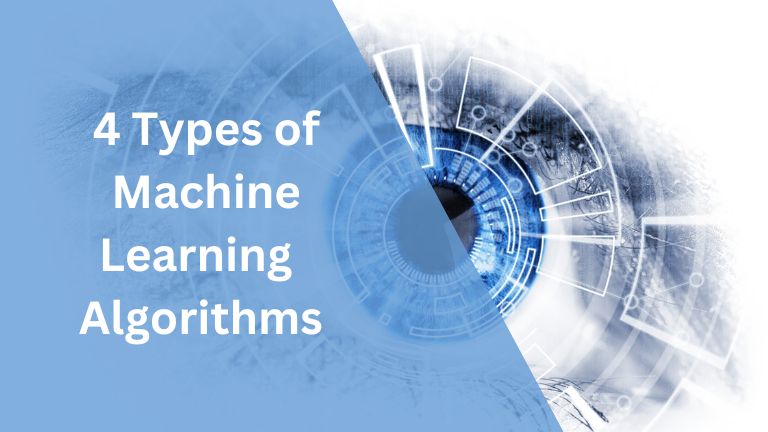Machine learning algorithms have revolutionized the field of artificial intelligence. They are also becoming an integral part of various industries.
In simple terms, these algorithms enable computers to learn from data. It allows them to make predictions or decisions without being explicitly programmed.

In this article, we will explore different types of machine-learning algorithms and their applications.
- What is Machine Learning Algorithm?
- Types of Machine Learning Algorithms
- Applications of Machine Learning Algorithms
What is Machine Learning Algorithm?
A machine learning algorithm is a mathematical model or a set of rules. It enables a computer to learn patterns from data and make predictions or decisions
These algorithms analyze large datasets and identify patterns. This is in turn used to make accurate predictions or take specific actions.
Types of Machine Learning Algorithms
Before diving into the specifics, it’s essential to understand the different types of machine learning algorithms.
Machine learning algorithms can be categorized into several types based on the learning approach they employ.
Let’s explore the most common types:
Supervised Learning
Supervised learning algorithms learn from labeled data. Here the input variables are mapped to known output variables.
The algorithm analyzes the training data and learns the underlying patterns. Then those patterns are used to make predictions on new, unseen data.
It is widely used in various applications such as image classification, spam detection, and sentiment analysis.
Examples of popular supervised learning algorithms include linear regression, decision trees, and support vector machines.
Semi-supervised Learning
A combination of unsupervised and supervised learning is called semi-supervised learning algorithms.
They use a small amount of labeled data along with a large amount of unlabeled data for training.
These algorithms leverage the available labeled data to guide the learning process and make predictions on unlabeled data.
Semi-supervised learning is beneficial when obtaining labeled data is expensive or time-consuming.
Unsupervised Learning
Unsupervised learning algorithms learn from unlabeled data. In this, the input variables are not mapped to any known output variables.
These algorithms identify patterns and structures within the data without any prior knowledge or guidance.
Clustering, dimensionality reduction, and anomaly detection are common applications of unsupervised learning.
Common unsupervised learning algorithms include clustering algorithms like k-means and hierarchical clustering.
Reinforcement Learning
Reinforcement learning algorithms learn by interacting with the environment.
The algorithm takes actions in the environment and receives feedback in the form of rewards or penalties.
Based on this feedback, the algorithm enables them to optimize their decision-making process and learn to maximize rewards over time by adjusting its actions.
Reinforcement learning is widely used in applications such as game playing, robotics, and autonomous vehicle control.
Applications of Machine Learning Algorithms

Machine learning algorithms have diverse applications across various industries.
Here are a few examples:
- Healthcare: Machine learning algorithms are used for diagnosing diseases, predicting patient outcomes, and drug discovery.
- Finance: Algorithms are employed for fraud detection, credit scoring, and stock market prediction.
- Marketing: Algorithms analyze customer behavior and preferences to personalize marketing campaigns and recommend products.
- Transportation: Machine learning algorithms are used for traffic prediction, route optimization, and autonomous vehicle navigation.
- Manufacturing: Algorithms optimize production processes, detect defects, and predict maintenance needs.
Conclusion
Machine learning algorithms have transformed the way we solve complex problems and make predictions in various domains.
From supervised learning to reinforcement learning, each algorithm type has its unique characteristics and applications.
By leveraging the power of these algorithms, industries are achieving higher efficiency, accuracy, and decision-making capabilities.
Frequently Asked Questions (FAQs)
What is the importance of machine learning algorithms?
Machine learning algorithms enable computers to learn from data engineering. It makes predictions or decisions without explicit programming. They are essential for solving complex problems, optimizing processes, and making accurate predictions.
Are machine learning algorithms only used in the field of artificial intelligence?
No, machine learning algorithms have applications in various industries such as healthcare, finance, marketing, transportation, and manufacturing. They enhance decision-making and improve efficiency in many domains.
What are some popular machine learning algorithms used in image classification?
Popular machine learning algorithms for image classification include Convolutional Neural Networks (CNN), Support Vector Machines (SVM), and Random Forests.
How do unsupervised learning algorithms work?
Unsupervised learning algorithms analyze unlabeled data and identify patterns or structures within it. They do not have any prior knowledge of the output variables and explore the data to discover hidden insights
Can machine learning algorithms be used for real-time decision-making?
Yes, many machine learning algorithms can be trained and deployed for real-time decision-making. They can analyze incoming data streams and provide predictions or actions in real-time.

